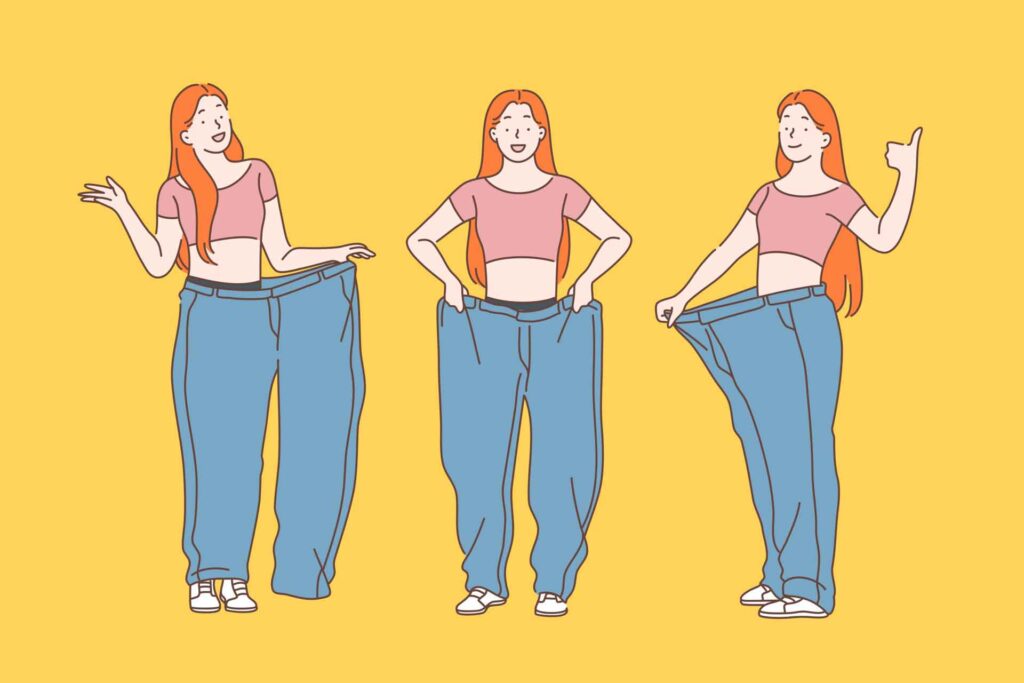When trying to lose weight, many people fall into the common diet trap and see immediate results. While there are ways to speed up your weight loss efforts, it’s important to understand that losing weight too quickly can strike you back. As in many areas of life, safe, successful, and sustainable weight loss is more about the journey than benchmark-based goals and looming deadlines. Weight loss can improve heart health and reduce the risk of a dangerous disease like obesity.
Losing weight in a secure, wholesome, and appropriate manner is the best way to long-time period success. When you consider that slower weight loss is usually thought to be safer, three months is adequate time to lose a large amount of weight. During this period, it is safe to focus on losing about 12 to 20 pounds, which turns out to be about 1 to 2 pounds a week. So if you’re interested in losing a small to moderate amount of weight, there are a few things you can do to help you lose weight slowly and safely in three months.
Zenith Weight Loss Solutions : Zenith is a rehabilitation and weight loss clinic, we need 90 days to transform your life, on average our patients lose 20 to 40 pounds, Zenith focuses on getting the root cause of weight loss and fixing it with healthy lifestyle changes. Zenith weight loss experts include :
- Medical Doctors
- Nurse Practitioner
- Functional Rehabilitation Specialists
- Chiropractors
- Nutritionists
- Massage Therapists

Easy to follow steps by Zenith :
- Schedule a new Patient appointment
- Medical Consult and Examination
- Physical Performance Exam
- Day 3 to 30 Physical Rehabilitation
- Day 31 to 60 Foundational Rehabilitation
- Day 61 to 90 Functional Rehabilitation
- Day 91 Onward Wellness Care
Visit Zenith Clinic and lose 20 to 40 pounds in a healthy way within 90 days.
The course of action to lose weight in 90 days without medications :
Visit a Dietitian : Before starting the weight loss process consult a doctor or licensed dietitian. Your dietitian will be able to tell safe and healthy diet plan for you. Dietitian may also be able to provide additional advice or recommend alternatives that are better suited for your health. A registered dietitian is a nutrition expert who can offer you a more effective weight loss diet. They can create meal plans to help you achieve weight loss and guide you through healthy foods to help you lose weight.
Drink adequate quantity of fluid : Staying hydrated can also help with weight loss. Aim to drink about 64 ounces (8 glasses) of clear, sugar-free liquids every day. This is a general rule, but a good place to start. Feeling dehydrated or thirsty often feels like hunger. This may encourage you to eat when all you need is a few glasses of water. Avoid sugary drinks. Avoiding sodas, fruit juices, punches, sports drinks, energy drinks, Kool-Aid, sweetened teas, sodas, and sweetened coffee can have a big impact on your daily calorie intake and help reduce weight.

Exercise Regularly : Regular Exercise helps in losing weight too. Apart from dieting, exercise is one of the most popular strategies used by people trying to shed more pounds. It burns calories and plays an important part in weight loss. In addition to helping you lose weight, exercise is associated with many other benefits, including improved mood, stronger bones, and reduced risk of many chronic diseases. Many exercises can help you lose weight. Eight exercises that are some of the best options for burning calories include :
- Walking
- Jogging or running
- Interval Training
- Swimming
- Yoga
Sleep More : The hormones ghrelin and leptin, which control appetite, can be impaired by inadequate sleep, making individuals feel hungry all day long and making it more difficult to decrease body and belly fat. Good sleep is needed for successful weight loss. According to recent research, sleeping an additional hour per night can aid with weight reduction. Without exerting much effort, sleep-deprived folks lose 270 calories every day.
Limit High-Glycemic Carbohydrates : The speed at which blood sugar increases after consuming a carbohydrate item is ranked by the glycemic index. When consumed alone, high-glycemic carbs like white potatoes and refined bread will trigger a spike in blood sugar followed by a sharp decrease. You experience hunger and a desire for more food as a result. Although further long-term study is required, recent short-term studies like this one show a correlation exists. However, high-glycemic meals are not completely off-limits. Working with a licensed dietitian nutritionist can help you balance your diet so that you don’t have blood sugar spikes, which can help you lose weight.
Eat Proteins, Fruits, and Vegetables : Research states that consuming adequate amount of protein helps support weight loss in addition to keeping you feeling satisfied. Eat lean proteins such as poultry, beef, pork, eggs, dairy products, and tofu. Fruits and vegetables are rich in nutrients such as fiber, vitamins and minerals, and are also low in calories. Filling half of your plate with fruits and vegetables can help reduce your overall calorie intake.
Eat 100% whole grain : Whole grains are a good source of fiber and some vitamins and minerals. If you choose to eat grains, try to choose whole grains whenever possible. Whole grains include brown rice, whole wheat pasta, oatmeal, quinoa, and whole grain bread. Popcorn is also a whole grain.

Do Cardiovascular Exercise : 150 minutes or 2.5 hours of moderate-intensity physical activity every week is recommended for fast results. Studies Show Regular Physical Activity Contributes to Weight Loss and Long-Term Weight Maintenance. Aerobic exercise includes activities such as walking, jogging, swimming, cycling, and hiking. Exercise alone won’t help you lose weight. The best combination is doing cardio along with a calorie-controlled diet for the best results.
Perform Strength Training : Weightlifting is another important part of the weight loss exercise routine. Strength training activities include weightlifting, pilates, and isometric exercises such as push-ups and crunches. Avoid daily weight training. After a strength training session, it’s important to let your muscles rest and recover.
Keep Track Of Your Meals : By recording your meals, snacks, and drinks in a food journal, you can be more aware of what you’re eating and stay on track with your new eating plan. Track as many days as possible. Ideally, track a few days on weekdays and weekends. Many people have different ways of eating on the weekends versus a more structured workday.
Check Your Weight Daily : Check your weight daily to see how you are coping with weight loss. A regular daily weight check will also help you stay motivated and improve your weight loss results. Get on the scale every morning as part of your daily routine, for example, just before brushing your teeth in the morning.

Practicing these actions for weight loss, exceptional results can be achieved within weeks and in 90 days you will lose a lot of weight in a healthy way without any medications.
